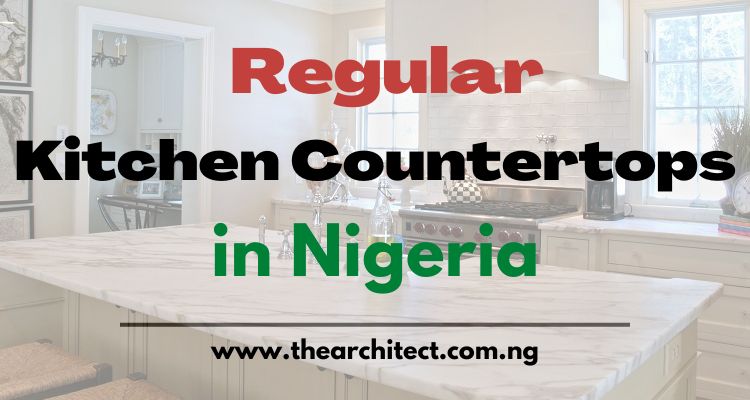
Choosing a Kitchen Countertop in Nigeria
- Posted by Ikenna N.
- On July 11, 2025
- 0 Comments
One of the most enjoyable aspects of the kitchen design process is picking the ideal kitchen countertop material for your new project. It is at that point that you start to tailor the design to your own taste. It frequently serves as the foundation from which subsequent style decisions are made. Not all worktop materials, however, are ideal for your new kitchen space. There are several factors that affect your choice of a kitchen worktop in Nigeria:
When choosing a worktop, you should seek answers to the following questions:
- How do you intend to utilize the space?
- What is your financial situation?
- Your level of willingness to maintain the surface over time.
It is advised that your designer/architect help you in doing this, thus reaching a more focused and well-informed conclusion. We will examine some of the most common kitchen countertop materials as we proceed below.
Table of Contents
Different Types of Kitchen Countertop in Nigeria
Laminate Countertop
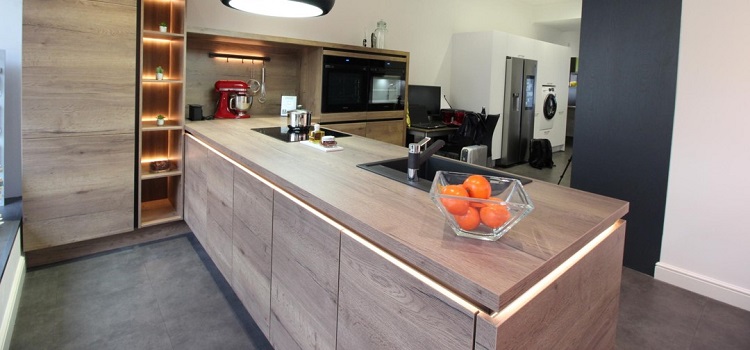
Image Source: kitchenfindr
Laminate worktops are a flexible and cost-effective way to provide comfort and quality for many years to come in most modern homes and workplaces. These worktops are fast evolving into a necessary component of every kitchen since they are inexpensive, versatile, and simple to maintain. For anyone with active kitchen demands, laminates are the first choice due to their strong resilience to heat and stains.
Laminate countertops are made from a layer of paper or plastic that is laminated to a particleboard base. The paper can be coloured in a wide variety of ways, giving laminate countertops the appearance of being constructed of various materials.
Compared to other materials, a high-quality laminate tabletop surface can offer a welcome combination of toughness, colour options, and affordable pricing. But not every laminate surface is made equally. The thickness of the lamination, the method of glueing, the kind of the core, and the final finishing procedure will all affect the material’s quality.
The Pros and Cons of Laminate Kitchen Countertop
Pros
- Laminate panels are the least expensive type of worktop available on the market.
- Tops made of laminate are incredibly robust. Despite being inexpensive, they have a great level of resistance to stains, intense heat, and scratching.
- Compared to natural stone, which requires pricey installation by specialized installers, laminate countertops are easy and inexpensive to install and only require basic DIY skills.
- They come in literally hundreds of different colours and finishes to suit every imaginable taste in fashion.
- Some laminates are so convincing at simulating the look of wood and natural stone thanks to recent advancements in HD printing processes that it is virtually hard to tell they are laminate.
Cons
- Like other types of worktops, it is not advisable to cut or set very hot cookware directly on the laminate. Always use trivets and cutting boards to shield the surface from possible damage.
- Due to the chipboard substrate, there is a chance that if one of the seams fails, water could seep in and cause the worktop to swell.
- They have lower resistance compared to other materials. As a result, it will deteriorate over time and with regular use. Other materials do not have this issue, so it is preferable to use a different kind of material that is more resilient and long-lasting if the kitchen will be used frequently.
Quartz Countertop (Engineered Stone)
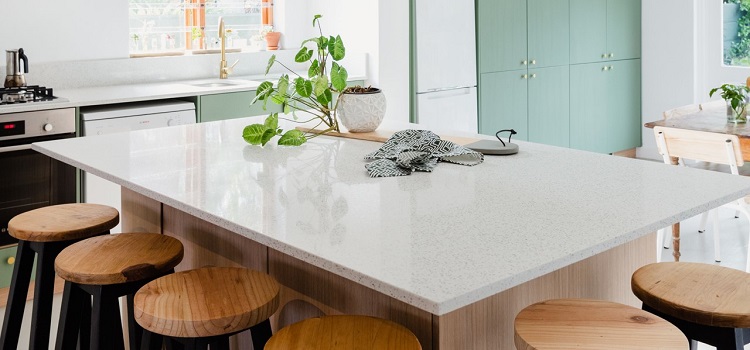
Image Source: theSpruce
For those who want some of the characteristics of a real stone surface, such as the look, style, and touch, without the higher levels of continuous upkeep and care required to prevent stains and damage, quartz worktops are a popular option.
Quartz worktops have a uniform appearance (design dependent) across the worktop and have been produced in a wide range of finishes. A slab of natural stone extracted from the soil can present itself extremely differently from one edge to the next.
Since the worktop is not porous, it prevents water and other contaminants from penetrating the surface. It might be claimed that quartz is a more usable surface for daily usage than natural stone since it is more resistant to physical and chemical degradation.
Like real stone, a manufactured quartz slab has a maximum size that is typically 3 m by 1.5 m. Your designer will take a joint into account if the size of your kitchen worktop required exceeds these limits.
Natural Stone (Granite or Marble Countertops)
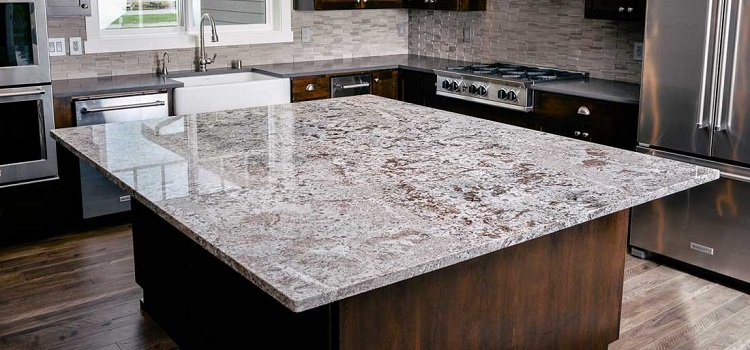
Image Source: IngenioVirtual
Due to the material’s decorative attributes, visual depth, organic intricacy, and luxury, natural stone surfaces are frequently chosen for kitchen countertops. Some types of stone are more durable than others and are better suited to the kitchen environment.
Because it is tougher and more practical than marble or limestone, granite has historically been a preferred material for worktops. Granite and marble are the most preferred, even though they have slightly different characteristics.
Before choosing a stone based on a little handheld sample, we advise visiting a stone dealer’s yard to inspect the full-size slabs. The appearance and detail of the slabs can differ greatly from edge to edge, so choosing the perfect slab for your project ensures that you will get it.
Natural stone surfaces cost about the same as engineered stone surfaces, and their cost ultimately depends on the size, thickness, and intricacy of the design that must be created to meet your needs.
The Corian Kitchen Worktop
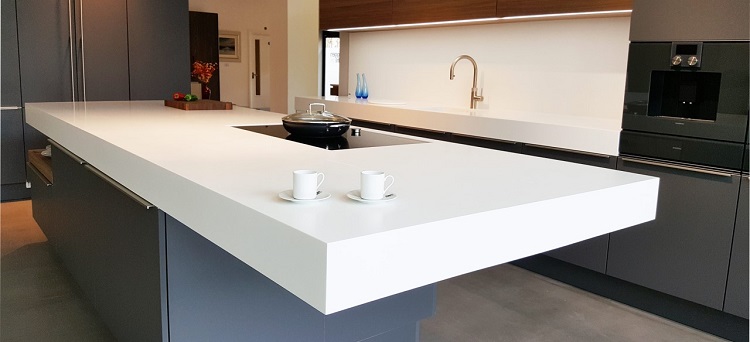
Image Source: counterproduction
The term “Corian,” which DuPont originally developed and sold as a product, is today recognized as a brand in itself. Minerals and resin are combined to create Corian, a material that is non-porous, mouldable, and ideally suited for kitchen worktops.
It is possible to incorporate sinks and draining board grooves, cascade the worktop down the sides of an island without any obvious joints, and even build seamless dining table extensions thanks to the ability to form various shapes. Additionally, Corian is accessible in a wide range of hues and finishes, even closely resembling actual stone elements, with consistent colour throughout the worktop.
Corian is softer than granite, quartz, or laminate, though, so what you gain in design flexibility you sacrifice significantly in scratch and chip resistance. Additionally, the material is prone to heat damage and is colour-sensitive to the wrong chemicals.
For instance, a stainless steel sink base should be added when a Quooker boiling hot water tap is required with a Corian sink to prevent unintended damage from the hot water. Fortunately, most surface damage can be fixed by a professional, but it’s a good idea to study the maintenance instructions first.
Stainless Steel Kitchen Countertop
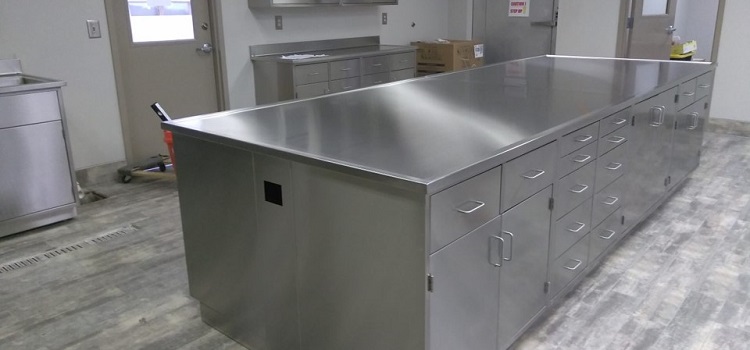
Image Source: LOC Scientific
Every professional kitchen has a stainless steel worktop because it is virtually unbeatable in terms of durability. One exception, though: regular daily use will result in light scuffs and scratches on a stainless steel surface. These marks typically get dimmer and more noticeable with time.
Stainless steel might not be the best option for you if you can’t stand seeing the surface get scratched, though. Some people consider the patina to be an archive of the kitchen, its culinary history, visitors, and recollections. Others may find the disorganised scrapes and marks upsetting and annoying.
This is merely a word of caution because only you will know how you may feel as that flawless metallic surface ages.
How Do You Choose a Kitchen Worktop?
Whatever kitchen worktop you select, there are advantages and drawbacks to consider. Your designer will assist you in reducing the possibilities to one that fits your style, design, and budget. Ask yourself and your designer lots of questions while you’re in a kitchen showroom. Take the time to look at the various worktops on display. You could ask the following questions:
- What size do I want my worktop to be?
- Will I like this style/colour/texture in 5 years’ time?
- Is the pattern consistent across the entire worktop?
- Can I see any seams along the edge of laminate worktops?
- What are my options to integrate sinks, drainers, and dispensers?
You will select the ideal alternative for your kitchen if you give your worktop selection the consideration it requires.
General Information on Kitchen Countertops in Nigeria
There is some basic information that you need to know concerning general housekeeping of a kitchen countertop. These include the following below:
- Hot pots and pans shouldn’t be set down directly on a worktop in order to protect the material.
- Engineered stone could become discoloured or break.
- Natural stone’s seal may deteriorate.
- Laminate may exhibit burn stains that are irreversible.
- The usage of trivets is something we would always advise,
- When cutting food or setting cups and glasses on workstation surfaces, always use coasters and chopping boards.
- When cleaning counter surfaces, we advise paying close attention to the right kinds of cleaning agents. For instance, using PH-neutral cleaning chemicals to prevent harming the surface glue or sealant. These are all according to the manufacturer’s advice.





0 Comments